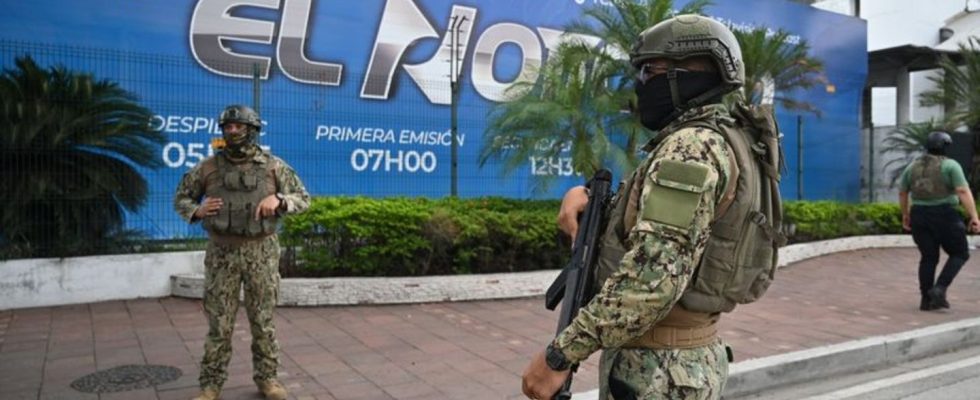crime
Violence in Ecuador: Gangs challenge the state
Soldiers at the TC television station, which was invaded by gunmen during a live broadcast. photo
© Stringer/dpa
The once peaceful Andean country is sinking deeper and deeper into the swamp of violence. Dozens of gangs are fighting for a piece of the pie in the lucrative drug business. But now they have overreached.
After an unprecedented show of force by the criminal gangs in liveThe Ecuadorian government has declared war on criminal gangs in the South American country on television.
Thousands of soldiers and police patrolled the streets and 70 suspects were arrested, security authorities said. Firearms, ammunition and explosives were seized in operations across the country. The officers also freed three police officers who had been kidnapped by gang members and arrested 17 escaped prisoners.
President Daniel Noboa issued a decree declaring 22 criminal groups as terrorist organizations and non-state warring parties that should be eliminated. “All of these groups are now military targets,” military chief Jaime Vela said in a speech. Ecuador is now in an internal armed conflict in the fight against organized crime, the decree continued. The security forces are therefore entitled to use lethal force against gang members.
Armed men storm TV studio
On Tuesday, gunmen broke into the premises of the state television station TC Televisión in the port city of Guayaquil during a live broadcast and took several journalists and employees hostage. “We’re on the air so they know not to play with the mafia,” a man said into the camera. Gunshots and people screaming could be heard in the recordings.
Special police units later brought the television station back under control and arrested 13 suspects. Weapons and explosives were seized, the police said. Those arrested are accused of terrorism.
At least eight dead
Across the country, members of criminal gangs carried out explosive attacks, set vehicles on fire and attacked security forces. According to police, at least eight people were killed in fighting in Guayaquil. Many businessmen barricaded their shops for fear of looting. The Ministry of Education announced that all schools in the country will remain closed until the end of the week.
The Inter-American Commission on Human Rights condemned the escalation of violence in Ecuador. She called on the security forces to respect human rights in their operations. “The fight against organized crime and crime is fundamental in the region,” wrote the Secretary General of the Organization of American States, Luis Almagro, on the X platform, formerly Twitter.
Due to chaotic conditions in the prisons, the government of the South American country only declared a state of emergency on Monday. Criminal gangs fought violently in prisons and took guards hostage. According to the prison administration, the head of the powerful gang “Los Choneros”, Adolfo Macías alias “Fito”, and the leader of the gang “Los Lobos”, Fabricio Colón Pico, apparently managed to escape.
Highest murder rate to date
For a long time, Ecuador was considered a relatively peaceful country on the violent South American continent – known for the unique fauna of the Galapagos Islands, majestic volcanoes in the Andes, panpipes and bananas. But the security situation had recently deteriorated dramatically. The murder rate of around 46.5 homicides per 100,000 inhabitants last year was the highest in the history of the once peaceful Andean country and one of the highest in Latin America.
In the middle of the election campaign, presidential candidate Fernando Villavicencio, who promised to fight against corruption, was shot dead after a rally in Quito in August last year. After his election victory, the young President Noboa announced that he would take decisive action against organized crime and break the power of the gangs operating from prisons.
How deeply the crime syndicates have already infiltrated large parts of society became clear at the end of last year. During Operation Metastasis, over two dozen suspects were arrested, including judges, prosecutors, police and prison officials. “The investigation shows how drug trafficking penetrated state institutions,” said Attorney General Diana Salazar at the time.
Multiple gangs with ties to powerful Mexican cartels are fighting for control of drug trafficking routes. Albanian drug traffickers are now also said to be involved. Ecuador is an important transit country for cocaine from South America, which is smuggled from the producing countries of Colombia, Peru and Bolivia to the USA and Europe.

